
|

|
LINKS FOR THE YEAR 2001 |
| [JAN] [FEB] [MARCH] [APRIL] [MAY] [JUNE] [JULY] [AUG] [SEPT] [OCT] [NOV] [DEC] |
Archives [Intro] [2000] [2002] [2003] |
|
Log for the week of December 2, 2001, New Caledonia and the Coral Sea by APW The new Autohelm came in one week after it was ordered, for a price less than the one advertised in our old West Marine catalogue. The fellows at Marine Corail gave us a good deal and broke the package open so we didn't have to buy the electonic parts, only the push-rod arm. We decided to cruise North of Noumea to a bay sixteen miles distant. We now had three autopilots on board and we wanted to make sure they all were in working order. Phil's rebuild on the original Autohelm worked well. Tillie worked fine for an old lady and the new Autohelm worked well too. We were running out of excuses to stay. 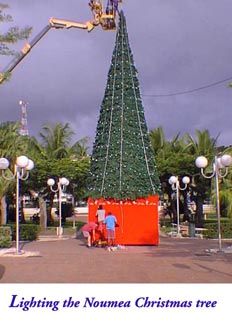
New Caledonia is the first country we have arrived in, where we felt we could live. Despite the language barrier, between the shopkeepers English and my Franish, we eventually get things figured out. The problem with New Caledonia, from a tourist standpoint, is that the really neat places to visit can't be seen by the average person that flies in and rents a car. One must have a boat. It seems that there are yacht charter business's in Port Moselle so that could be an option for anyone wanting an exotic getaway. Don't expect a lush humid tropical paradise. New Caledonia's climate is enjoyable, not oppressive. The plants are far more interesting than the jungle varieties of Polynesia. I have no idea what some of them were and may never find out. For the past two weeks or so, as Phil and I walked around town, we had been finding inch long oval brown smooth objects all over the side walks and parking lots of Noumea. At first I thought they were bugs, but on closer inspection saw that they were seeds of some sort. But it was strange as there were no trees over head. It was time for the Ecuadorian penny to decide our fate. Two out of three flips. I changed the zincs on the sea frost refrigeration system and the engine heat exchanger. The latter was almost all eaten away. Restocked once again, checked out once again. I had to wipe the tears out of my eyes when I told the Philippino agent we probably would not be coming back, after she cheerfully said to us "See you next year!" We wandered around town taking photographs and doing other touristy things, Other books complain of the copper smelting plant in the industrial harbor, artificially separated from the "touristy" harbor by a causeway connecting an outer island. It does belch out a yellow smoke, but is no more noxious than a small smudge in a corner fireplace in an English parlor. You sort of forget about it being there. I find it odd that in Paul Theroux's book the "Happy Isles of Oceana", New Caledonia never even gets a mention. The map in the front of the book sticks it in the middle of Vanuatu. We never had any intention of stopping here either! When we first put the web page together, I think our route went right around it, like it never even existed. The artist part of me has never seen a place with such high-key colors. It is like one big laundry soap commercial from the seventies- where the whites are whiter and the brights are brighter. I hope I can keep these images in my brain and do some really big canvases when we finally get home. But first we must get to Australia. APW 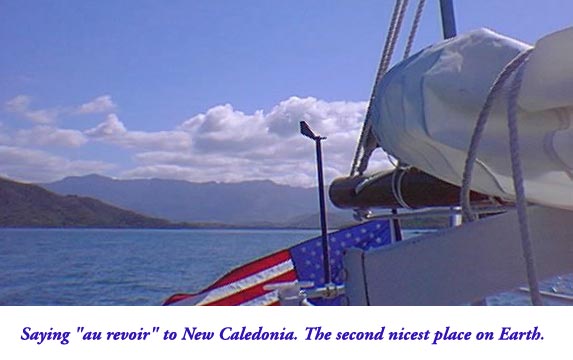 |
|
Log for the week of December 9, 2001 en route to Australia by PS It was a sad day when we left New Caledonia. It brought Amy to tears. I have now decided that New Caledonia is on the top of my list as the best place we have stayed. Good climate, good harbors, good food, good snorkeling. You get the idea. The week following our departure would also prove to be the worst passage we have ever made. Visions of Noumea came into our minds often. There were about a dozen boats waiting to leave for Australia. The weather between Noumea and the Australian coast consisted of ridges and troughs and occasional gales to the south. The ridges and troughs made for winds that shift from east to west and the gale systems to the south made for strong headwinds. The air currents around low-pressure systems go clockwise in the Southern Hemisphere, so their northern sides consist of west winds. Our Inmarsat-C put out an audible alarm for a gale system directly along our proposed route. The Inmarsat has put out audible alarms for missing vessels before, but never for weather. All in all, not good conditions for heading across the Coral Sea. Finally, a high-pressure system developed between Australia and New Cal, with a small gradient field (almost no wind). Given the choice, I would rather motor in a calm then tangle with gales. The rest of the fleet agreed, so we left with all the fuel we could carry. The majority of the boats headed for Brisbane, the shortest route to the Australian coast. Taheri headed for Coffs Harbor, Guadalucina headed for Lord Howe Island and we headed for Sydney. All of these routes were far to the south of the rest of the fleet. Ours was the longest, over 1,000 miles. You may recall that we could only import Stewart from Brisbane or Sydney. Brisbane is in the cyclone belt, so Sydney was really our only choice. Things went well for the first few days. Calm seas and plenty of power for the electrical system. We were actually able to sit at the table and eat our meals. A first since we made the passage from Manta, Ecuador to the Galapagos. Our suspicions for "Payback Time" were growing. We checked in with the "Nomba Net" twice a day. I was jealous to hear about the other boats arriving in port on Thursday, while we were still only half way to Sydney. On Thursday the winds came up from the southwest. A direct headwind. Agg. They picked up to 15 knots and we decided to head for Coffs Harbor. Even on that course, we had to use a double reefed main and motor-sail into a choppy sea. Gone were the three course, sit down, meals. At midnight the wind had eased and came around from the northeast. By noontime the wind had increased to over 25 knots from the west. So much for heading to Coffs Harbor. The barometer had dropped steadily over the past twelve hours. We changed course and headed back to Sydney. At this point, our plotted positions on the chart looked like the mark of Zorro. It was about this time that water started sloshing over the floorboards at the nav station. I discovered that the automatic bilge pump switch had failed. Not only that, but there was paper clogging up the pump intake! Evidently our extreme angle of heel, along with accumulating water in the bilge got some things wet that we hadn't planned on. We worked with a kitchen strainer and got most of it out. It wasn't much fun putting your head down in the bilge with the boat tossing around. Our five days of continuous motoring had the stuffing box dripping a pretty good stream. Amy had trouble getting a clear image on the fax. I worked on the problem during my watch and discovered that we needed to use a lower frequency. Getting weather information while you are five hundred miles from port is a mixed blessing. On the one hand you can prepare for what might be coming, but your sense of powerlessness is overwhelming. I would much rather deal with weather as an airplane pilot. Even in a Cessna 150, with a top speed of only 120 knots, dealing with weather is easy. You can see what is coming for a hundred miles. You can fly around bad weather or land at an airport and wait for it to pass. Not so in a boat at sea. We changed watches at eight PM. There was an approaching squall that showed up on radar. I calculated its speed at about thirty knots. We got ready to drop the sails, but it passed without the wind getting over 25 knots. At our next watch change, at midnight, another squall line showed up. This one was twenty miles across and approaching at forty knots. This one hit us hard. We got the sail down just in time. Tired of the up-down sail routine, we turned on the motor and slowly headed towards Coffs Harbor. Amy took her watch at 0400 and by 0600 I woke up when she turned off the engine. "What's going on?" I asked. "We are only making one knot" was her reply. So there we were adrift, no wind and the sea so lumpy we couldn't make headway with the engine! The barometer had seemed to bottom out at 999 hPa. Amy decided to make us a decent breakfast of bacon and eggs during, what seemed to be a break in the weather. Even the sun decided to show itself. I took my watch at 0800 and saw an approaching breeze from the southwest. We set a double reefed main and staysail. No sooner had we got the sails up when we were hit with 60 knots of wind. Iwalani lay over under her shorted sail until the edge of the cabin top was under water. The boom was almost completely submerged. What little sail was exposed to the wind was made as tight as a piece of sheet metal. Amy and I made our way along the lee deck, through waist deep water, to the base of the mast. Thank goodness for the high bulwark rail and high lifelines. In our haste to get the sail down we hadn't put on our harnesses. Iwalani was struggling like she never had before. Despite both of us pulling with all our might to get the peak of the sail down, it wouldn't budge. Iwalani continued her struggle to remain upright. With adrenaline strength, we were finally able to get the sail down. It was a long ten minutes. Now we were lying a-hull, no sails up and the boat still laid over, with her deck under water. Clearly she was not happy. The seas had risen to fifteen feet and were washing over her. We needed to get her facing down wind. Now was the time to use the reefed staysail. I never really thought I would have to reduce our sail area to a mere 50 square feet. After tying in the reef tack and clew, we set the sail. Amy said "What about the reef points?" I said, "Forget the reef points. Just get the sail up." Up went the sail and Iwalani eased off before the southwest wind, headed once again to Coffs Harbor. At this point I shouted into the wind at the top of my lungs, giving it a few unmentionable insults about it's parentage. The wind blew over forty knots for the rest of the day. Amy had never seen wind as bad as this.(Editor's note: the seas to Jamaica were still worse. This was the most wind I have seen while underway-APW) I have seen worse. It was during my first passage at sea, more then thirty years ago. I was crew aboard a thirty-six foot sailboat headed from Maryland to New York. A northeaster had come up while we were in the Gulf Stream. With the wind against the sea the waves were tall and steep. You could only see the horizon when the boat was lifted on top of an exceptionally high wave. I hope I never see conditions like that again. The winds gradually eased overnight and I set a double reefed main and full staysail. By 1 PM we were in Coffs Harbor tied to a courtesy mooring. We took to our bunk to get some much-needed rest. Amy didn't get any sleep though, as she thought that the nearby jetty was getting closer. I woke up around 5 PM and, from our bunk, I saw the jetty was much too close. Once on deck I discovered that there was only five feet between our rudder and the pilings. Amy called the Coast Patrol on the VHF and informed them that we were dragging their mooring. Knowing that we had a cat on board, we asked about anchoring in the harbor. They said we should go into the marina because the holding wasn't very good. I was a bit leery about berthing in the marina, as there was now a pretty strong crosswind. After explaining to the marina that we don't maneuver well in tight places, we finally decided to try for a slip that would push us against a float dock, not another boat. Other yacht owners heard our conversation and offered to help us land. We dropped the mooring and motored into the marina. The crowd on the dock made it obvious where we should go. With a bump against the float dock, Amy's fast reaction with a fender and the many helpful hands on the dock, we managed to get tied up without doing any damage to the adjacent boat. A pretty good feat as there was only about six inches of room on either side of Iwalani. Now we could finally get some sleep. Of course there was the problem of being tied up at the marina with the furry four legged terror to Australia on board…… PS Log for the week of December 16, 2001, by APW Coff's Harbor Australia "Are you aware that being at a marina is in strict violation of Australian's quarantine laws?" Our first words of welcome by an Australian official. "Is your cat tightly sealed below?" I had visions of Stewart squeezed into a mayonnaise jar. Mouth and nose sealed shut with duct tape. I told the two officials, Paul and Rachel, that Stewart was crippled and couldn't get up the companionway ladder, much less jump off the boat. I am sure every pet owner says the same thing. The sad thing in Stewart's case is it is really true. We told them we knew about the laws, were in the process of importing our cat into their country and were told to come into the marina by "Coastal Patrol" the Aussie equivalent to the US coast Guard. "Give me the cat's paperwork then and I must go make some phone calls." Paul said, his official work done. He turned and left us in the hands of Rachel, his very good looking and pleasant assistant. She came on board with the usual paperwork and forms to fill out. Coff's Harbor has no quarantine officials, yet still is considered a port of entry. The customs officials are made to do the quarantine officials jobs and as Rachel said, she has no idea what to be looking for in terms of animal disease. She apologized for the $130.00 quarantine fee we were charged even though there were no officials to do the work. Then she put on some latex gloves and went around Iwalani with four different small cloth wipes, rubbing the surface for narcotics. (If they come back positive Stewart has some explaining to do.) She put all our garbage in a huge bright yellow heavy duty bag, something I was happy to see, as I thought it stupid that some of the other countries took our perfectly good fruits and veggies and had no interest in properly disposing of our garbage. She took our popcorn, mayonnaise, sprout seeds, French cheese, Stewart's cat food, except for the two cans of French Sheba, which he has become very fond of and we both begged her to leave. She also tried to take my hard boiled eggs, which I told her we would be eating for lunch. She forgot to ask about meat, luckily we had only a pepperoni pizza left, which we ate up later that day. None of our wooden artifacts were asked for and I had forgotten about them myself. None of our shells were looked at. We had heard from Willy Bolton that the New Zealander's took their giant clam shells, so we sent ours back to the US from New Caledonia, to the tune of seventy US dollars. Every boat had a different experience with customs and quarantine. One boat up in Brisbane had a slingshot and blow dart gun taken away. We had also heard through the grapevine that they sent beagles in slings up the mast to sniff out narcotics hidden up high. But in our situation, both Rachel and Paul were very distracted by Stewart. I made a joke about this fact on Stewart's web page even before we arrived in Australian waters. It turns out to be not much of a joke. We could have arrived with enough weapons for a small army, no one would have known. No one even opened the door to the engine room or bathroom. We could have had a family of refuges on board, including their aunts and uncles, each of them carrying a bazooka and an AK47. Because of that, I am convinced that Osama Bin Laden is no where near Afghanistan. He is hiding in the Australian outback. All he would have to do is come to Australia by yacht with a cat on board. What exactly are the Australian's so scared of? Rabies. Rabies is caused by a virus, which can only be transmitted via saliva through a bite, or by drinking or washing in the saliva of an infected animal. The virus when introduced through a bite wound, travels to the brain via a peripheral nerve and the main highway of nerves, the spinal cord. The only test for rabies is to find the virus in the brain. Which can only be accomplished once the animal is beheaded. Tests which pretty much preclude a healthy individual upon completion of the diagnosis. The further away the virus is from the brain when it is introduced, as in a bite to the big toe, the longer it takes for the virus to walk at virus speed to the brain. Hence the longer it would be for clinical signs to appear following a bite. Smaller animals have smaller distances for the virus to travel, thus shorter incubation periods. This is why if a rabid animal does bite a person, virus neutralizing antibodies can be injected as a road block, preventing the virus from reaching the brain. In the sixteen years I have been in private practice I have not seen a single case of rabies. Granted, I left Maine just as the raccoon rabies had arrived. I have "put to sleep" (murdered actually) hundreds of animals that showed clinical signs of rabies, were never vaccinated or were sick and had bitten a human. Every single one of them was negative. I know that Matt, my old boss, has had some positive cases. One of which was a dog who had only received one rabies vaccination during its entire lifetime. Most of the cases in Maine are in bats, raccoons, woodchucks or foxes and were taken care of by the animal control officers and the state, rather than the local vet. In one of my textbooks it says that over 30,000 people die annually from rabies. I couldn't believe that figure so looked it up on the internet. The internet said 60,000 humans die annually. Where on earth are these people? Yea sure, six feet underground, but under whose ground? I am sure rabies isn't exactly first on the list of differential diagnoses for an American physician presented with a neurological case. We spent some time last week visiting the local veterinarians. I wanted to get a feel for this rabies paranoia. Was it a real fear that everyone had including the local vets, or was it a planted fear by the quarantine officials to get money and legitimatize their jobs and the quarantine station's existence? As it turns out, there really is a fear of rabies. One of the Vet's we talked to had just come here from the UK and had been in the middle of the foot and mouth outbreak, a disease which arrived in Britain via a ship. A pig farmer was getting the raw garbage from the ship and feeding it to his pigs, without it being processed or cooked. As horrible as that whole ordeal was, with cloven hoofed animals dying right and left, tongues sloughing off and no time for sleep, this vet was still more leery of rabies. The officials are under the impression that a cat with rabies will be lying curled up asleep in an armchair next to the fire and in a sudden furry fury of foam, froth and claws, become a ten pound Stephen King nightmare. Coff's Harbor has a main harbor where we alone are anchored, a smaller corner harbor where we dragged the quarantine buoy when we first arrived and an inner marina harbor well protected from the elements by man made jetty's. There are lots of working fishing boats, an incredibly good ship's chandlery, ice cream parlor, Phil and I actually went as far as to rent a car and drive down to the station. It was over 600 kilometers there and back, on fast highways and single lane rutted roads. It took over seven hours one way, with Phil doing all the driving there and on the return, on the "wrong" side of the road. It was his idea actually. How many husbands out there would make such a suggestion to ease their wife's worries? Driving from Coff's harbor to the quarantine station just outside Sydney, took us through forests of eucalyptus trees, passed farms and fields with beef cattle as big as small locomotives. If these guys developed foot and mouth it would be a logistical nightmare to move their rotting carcasses around. We drove through hilly terrain reminiscent of up state New York. It doesn't really seem like we are in a foreign country since the road signs, KFC's, MacDonalds etc all look American. With one big exception. We drove past eight squished kangaroo along the road, two pulverized koala bear and in the suburbs of Sydney one flattened Goffin's cockatoo. At least what was left of it looked like a Goffin's. I wanted Phil to stop along the road so I could poke around through some of the dead bodies. I especially wanted to check out the pouches on the kangaroos. There really wasn't any safe place for us to pull over, so I didn't get a chance. That is what really makes Australia quite special and why we left the pastries, colors and technology of New Caledonia behind. Just walking into the town at Coff's harbor, we passed flocks of rosella cockatoos. Parrots are as common here as crows back home. They are everywhere. Shrieking and squawking and filling up the sky like brightly colored party streamers. We had little trouble finding the quarantine station as the roads are very well marked. The quarantine station is composed of a complex of single story flat roofed industrial buildings in the elbow between two major highways. Behind the quarantine station is a large cemetery. The people that work in the station are all very nice and helpful. They allow visiting on Tuesdays and Thursdays, or more frequently if you butter up to the animal's handler. Ray, one of the handlers that has been there for sixteen years, endeared himself to me by saying that the animals come first, the owners second. This has always been my philosophy as a vet, a practice which didn't sit very well with some of my bosses. The cattery is a building separate from the others. Each cat "room" has a big heavy metal door with a small glass window for viewing the cat. The floor space is composed of five square feet of smooth cement. The litter box and dishes are on the floor. There is a small three inch wide ramp which leads to the main shelf which holds the covered cat house and bed. Another three inch wide ramp leads up to a hole in the roof where there is a small fenced in rooftop penthouse. A full-length open window, about sixteen inches wide, covered with wire fencing keeps the cat separated from the outdoors. It is all very nice and much more spacious than I had imagined. The only problem is that there is no way Stewart can negotiate the ramps to get off the floor. He will be spending his thirty days living on the damp cement. Think I am happy about that? The other thing which has me worried is that Sydney is known for the most lethal variety of spider in the world. The funnel web spider. There is nothing which keeps the spider away from the cats. This time of year is also the tick season in Australia. They have a very nasty type of tick paralysis, which mostly affects dogs, but cats have been known to get it also. The cats are dipped upon arrival at the station, so hopefully that will help repel ticks. The landscape seems as dry as a tinder box- a bush fire is a real possibility too. So why are we even bothering to get Stewart imported? If we didn't import him we would be forced to stay anchored mid-stream if in a river, mid harbor if in a harbor. "Aren't we a hazard to navigation?" I politely asked the officials. Smart aleck American. Any time we wanted to go in and get fuel, we have to have a quarantine rep at the fuel dock to monitor the situation. Forget about ever staying at a marina. Getting the boat hauled? What are you crazy? They could care less if Iwalani sprang a leak, sank and spewed diesel and oil all over the beaches. We have a c-a-t on board, a far greater threat to the environment. We can only go into ports that have a quarantine or (their representatives) presence. We are only allowed three months with a c-a-t...after that I have no idea what happens. We also have six month visas for Australia. By the time we leave the last port in Australia more than six months will have expired. That is why we are flying to New Zealand, so we can reset the clocks on our visas. There is no way I am flying off to a foreign country leaving Iwalani anchored mid-stream somewhere with Stewart on board and both boat and cat in the care of some pimple faced teenager. That's just not going to happen. However, it doesn't seem to bother the Australian officials. For that is what most cruising yachts end up doing. We are right now anchored in the worst anchorage of the trip so far. Phil keeps saying as if to convince himself, "It is not as bad as the Marquesis, is it?" We have the 100 lb Luke storm anchor out along with the 65 lb. CQR. The swells come in through the harbor entrance, rolling Iwalani from side to side like a metronome, before crashing behind us on the beach. Friday night we went to see "Harry Potter". I didn't feel quite right. When we got back to the boat, we were really rolling around. I spent the next twelve hours losing stuff out of every orifice on my body. I have never been so sick in my life. I actually considered for a brief moment that I might have anthrax. I guess that goes through every American's brain nowadays, each time he or she coughs, sneezes or has an upset stomach. I became worried when the "stuff" I was spewing started getting bloody. Phil wanted to take me to the hospital. 'We are on a hospital' I tried to tell him. There was no way I was going to be winched off the boat and carted off like a sick walrus. The only problem was, I was too weak to get to the drugs I needed and he had no idea where they were, much less how to administer them. He put a scopolamine patch on me, which helped enough so I could talk. I couldn't keep water down and was becoming very dehydrated. All I could think about when I was awake, was how nice it would be to drink gallons of deliciously cold gingerale. Phil found the Compazine suppositories and between them and a bottle of Pedialyte, (water, electrolites and sugar) I slowly started to return back from the dead. As gross as the pedialyte was, I didn't throw it back up. It was Phil's mother who told me to have that on board. I wouldn't have thought of it. I have no idea what disease I actually had. I am sitting up typing this, despite being seated in a cheap carnival ride (Iwalani rolling around) and my body seems pretty well stoppered up. The Australian's we have met have been very nice and very helpful. We knew this was going to be a country with lots of red tape before we arrived. That is what it says in all the cruising guides, including the book by Alain Gerbault written in 1932. "We can't be all that bad?" the Aussie's ask us, "Surely, no worse than any other country?" Yes Australia your "officialdom" is far worse than any country we have yet visited. Of course we haven't visited any communist countries yet, nor have we tried to get back into the United States. The Australian's can't help having this suspicion that everyone's up to no good- it's in their genes. These are people whose main start in life was watching over and guarding convicts. They kind of have a big hang up about that too. Funnily enough, they all blame America for the convict issue. Pick up any Sydney Guide book and it will say nearly the same thing in the introduction: "Sir Joseph Banks, botanist aboard the 'Endeavor', recommended the new land as a penal settlement for England's convicts who were overcrowding the facilities back home, especially since the recent loss of the American colonies during the war of Independence" Now what is that supposed to mean? Someone must have skipped over that section in my history books. I never knew that America was a penal colony. I thought only religious zealots first populated the American shores. Did I miss something? A huge surveillance camera is aimed at Iwalani right now from the top of the customs building, making sure Stewart doesn't haul him self up the companionway ladder for a little fresh air and sunshine on deck. Things must be pretty boring indeed if the authorities need to monitor this American cat. Even the vet's offices we have visited have video camera surveillance in the waiting rooms. You never can tell when someone may pinch a flea collar. We met a great veterinarian named Garth McGilvray, a former president for the Australian Veterinary Association, who is sympathetic to our plight as he has sailed his own boat to Fiji. He also is on the board of veterinarians who grant US vets Australian licenses. I got some of the paperwork from him in order to start the process to get my Australian license. I figured I would be paying a fee as well as supplying a copy of my Maine license. It turns out they need a letter from the board of medicine in Maine stating that I am a veterinarian in good standing. The reason for this, as Garth explained to me, is that someone could have a valid license, commit a crime and then move to Australia looking for work. I am not sure I would have thought of that. I wasn't planning on working for money, as my Visa is the no-work kind. Any work I would do here would be strictly voluntary. He said I needed the Australian license, even for that. He is involved in rehab. work for the local koala bear population. "You mean there are koala bears right here in town?" I asked incredulous. "Oh sure" he replied, "most people never see them though." Garth saved a koala for me so I could do an autopsy on it. Illegally no doubt, but it was great being back inside an animal, even if it was a dead one- and a koala no less. Being a Vet is the greatest job on Earth. The koala bears have been getting a chlamydia organism which causes a severe eye infection. This one, an eight year old skinny female had been treated for the chlamydia but had died from endocarditis, an infection in her heart, which seems to be a common sequelae to the chlamydia. Her stomach was full of eucalyptus leaves, their main diet. Which, as Garth said, is the main reason for their being so placid. " You give a kid a bottle of eucalyptus oil and they're off in la-la land, koala's are no different." Okay. Okay. It would totally destroy the cute and cuddly image of the koala bear, if they started tearing around town foaming at the mouth chomping at fingers instead of eucalyptus leaves in a rabid rage. So, I guess Australia has a legitimate concern about keeping this disease out of their country. I just think they need to reconsider the policy about animals arriving by yachts. Most of us out here have been in rabies free territory for over six months. After getting this far with a pet on board you can safely assume that the people on board are pretty close to their pet. If the animal has rabies it's a guarantee the owner does too. I am sure all of us would rather pay an import duty and the quarantine fee, rather than subjecting our animals to the quarantine station, as nice as it is. If the animals arrive vaccinated, microchipped and have a rabies titer** drawn up six months before arrival, why couldn't they be "self" quarantined aboard the yacht for a predetermined time based on the relative body size of the animal? In and of itself, a yacht is a perfect quarantine set-up. That's what they used to do way back when, life was simpler and Black Death was a disease to be reckoned with, not some rock and roll band. I know. I know. I am just another know it all American arriving in a country telling that countries people how things should be done. I can't help it, I am an American and it's in our genes. The Aussie's do seem to take life's pleasures seriously. They are heavily into gambling and the drinking age appears to be about ten, judging from the number of pre-teens seen wandering the streets with brown bagged bottles. They even have drive through package stores. I am not sure, but I think prostitution is legal. Anyway, there are advertisements in the magazines saying stuff like "Gents check us out for tender loving care" and they aren't talking about hair coloring either. In Coff's Harbor everyone has white skin. The older "blokes" are all American sized, wearing knee socks and shorts, with wide brimmed hats that tie under the chin. There is a restaurant in town called the "Hog's Breath Café." It's actually one of many "Hog's Breath Café's" as they appear to be a restaurant chain. A place I may never get the stomach up to try. Our exchange rate makes it almost a half priced sale. Electronics are somewhat cheap, hotels very cheap. Food is about the same as the US. No more UHT cream, just regular cream that requires refrigeration. There are no DVD rental places. Video is the big thing here. They even advertise turntables in the newspaper fliers. Phil still thinks he can get Internet hook up, when and if we are allowed into the marina. I think he may be pushing the technology envelope, just a bit. That's were we are at now. Phillip Widders, the chief veterinary officer for AQIS wants us to take Iwalani to Sydney, where they can come to the boat and pick Stewart up. Customs will not allow us to make any stops along the way, because of Stewart. So what are we going to do? I was very tempted to bring Stewart down with us when we drove to the station. They would have put him to sleep once we arrived. We have come up with many plans. Even going over the edge into illegal territory. Plan C was actually Stewart's idea and one I liked too, but was totally illegal. Phil, Mr. Goody-two-shoes, was totally against it, as he is with any illegal activity. (You'll have to read about Plan C when the book comes out. I can't go into it here.) So here we are, one week later, still no closer to a workable solution. Rolling our eyes out in our metronome home, left then right, then back again. Any other man would be quite upset with me for even owning a cat. Phil just shrugs and says there is no way we could have gotten this far without Stewart. What a guy. What a cat. What a lousy anchorage. APW *'Cruising the NSW Coast' by Alan Lucas **A titer is a measurement of antibody levels. A positive titer usually means exposure to a disease. In the case of Rabies, a positive titer means the animal has antibodies to rabies, which can be from a vaccination or from the actual disease. One can not differentiate between the two. One of my life's goals is to invent a pre-mortum test which will differentiate between a vaccine exposure and the real disease. A goal I am not able to accomplish rolling around out here in the South Pacific. Log for the week of December 23, 2001 Coff's Harbor by PS Happy Holidays everyone. We hope that this holiday season finds you well and that Santa granted you at least some of your wishes. He certainly did for us. We received word from quarantine, on Tuesday, that Stewart could fly to Sydney from Coff's Harbor. Their biggest concern was getting him from the domestic side of the airport to the international side. Seems they were not set up to do pickups from domestic flights. Also, we had to make sure that no other animals were on board the same flight. Not an easy thing to predict because people could board at the last minute with a pet. Also, the local customs people had to agree to handle the transfer, because there were no quarantine officers in Coff's Harbor. They did, which now left it up to us to make the flight arrangements. We booked a flight for Thursday at 10:30am in case we had to catch a later flight. We headed back out to Iwalani with high hopes for a berth at the marina in the near future. As if to get in its last licks, the weather up to Thursday was "atrocious" to quote the weatherman. Getting on and off Iwalani from the dinghy took careful timing, as she rolled her topsides high above the water. I told customs that I would come into the marina on Thursday morning, with their approval. If the weather was to bad to get berthed, then they were going to come out in the police boat and pick up this highly dangerous animal. 
The wind moaned in the rigging all night on Wednesday. It seemed to let up around daylight, so I kept my fingers crossed. If I had to spend one more night as a leper, I was going to loose my mind. We called Harbor Patrol at 8:30 am and received permission from customs to come in. Our long stay on two anchors had allowed Iwalani to spin around several times. I tried to power her around in circles to get untwisted, but the wind was too strong and she just wouldn't go around. 150 feet of the port anchor chain was out, but there was still 250 feet of rope in the anchor locker that I had spliced to the chain. I pulled the rope on deck and tossed it in the dinghy. Then I pulled the dinghy around the starboard anchor chain to get things unwound. It was a bit tricky, as I had to duck under Iwalani's bowsprit with her bobstay trying to cut the dinghy in half. I was not going to let anything stop me from reaching Nirvana (AKA marina). After a good bit of blue air, I got things squared away and we headed in. The wind gods held off there fury just long enough for us to get tied to the dock. Rachel met us and used the "official" quarantine lock to contain Stew in his carrier. Amy got a ride to the airport with Rachel while I followed in the rental car. We all held our breath as people got their tickets. We didn't see any pets so we thought we were in the clear. Then a man came out of the ticket office and said that there was a box of pidgeons going on the flight. He asked if that was going to be a problem. "No" Amy reassured him. "Birds don't get rabies." He still wasn't keen on the idea because of the whole "Cats like to eat birds" thing. He didn't want the plane arriving in Sydney with a box full of feathers. We promised that Stewart would remain firmly locked in his cage for the duration of the flight. I had not been feeling well all morning and as Rachel and I watched Amy board the plane, I almost passed out. Seems Amy's stomach problems of last weekend had finally caught up to me. I barely got the car rental extended and the DVD returned before it knocked me down for good. I staggered into the bunk and didn't stir until 3:30am the next morning. The wind was moaning in the rigging and I was glad not to be out at anchor in my condition. I planned to leave at 8am and drive down to see Amy and Stew at the quarantine station, so I headed back to bed to rest up some more. The drive to Eastern Creek was uneventful except for the MacDonalds cheeseburger that I thought I was up for. I guess my stomach thought different. I arrived to find Amy in Stewies cell reading the latest Clive Cussler novel. Things were not going well between the two of them. It seems that whenever she tried to look at him he would hiss at her. When I arrived, he came out of his house and rubbed up against me. He still wasn't talking to Amy. "He'll get over it." I said. We made arrangements to visit again on Monday and headed to the Voyager Motel a few blocks away. For $100 Aussie dollars it wasn't much. There was a bed; some towels (no wash cloths), highway noise and a TV with three channels. It was clean though. 
Saturday we headed for Sydney. We made our way to the city center and found a place to park. We looked around at the towering hotels and headed to one a few blocks away called the Ana Harbor Grand Hotel. Amy picked out a room over looking the harbor from the ninth floor. For a little more then twice the cost of the Voyager Motel we were treated to "Deluxe" accommodations. From the fine furniture and bathroom fixtures to the full sized bathtub (Neither of us had taken a real bath since we left Beaufort SC one year ago) There was even a well stocked mini bar, cable TV and Web TV. I had seen Web TV a few years ago when I was working at DeLorme. It had quite a few shortcomings then and still has a long way to go now. After trying several times to write e-mail to our family, we gave up. I suppose that if my sons were here they could have figured it out. They decided to stay in the US, what with all the turmoil with air travel. It's just as well because Australia had a terrorist alert for US and Great Britain interests in their country during the Christmas holiday. 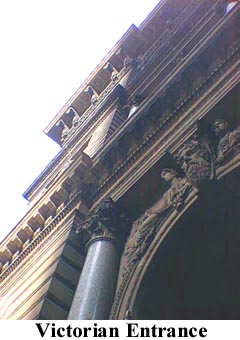
I was finally getting hungry, so we headed out and found a nice café. We were at the quay where city planners had brought together the ferries, trains and busses. The sidewalks were full of tourists, many of whom were from Japan. There were lots of young back packers and families on Holiday. This is the summer season here, so kids are out of school. Sydney has a wide variety of architecture; from glass and concrete high rise banks and hotels, to restored Victorian buildings covering an entire city block. The business in the heart of town is geared for the tourist. Lots of places to spend money. Amy couldn't resist and went shopping for some new clothes. The prices seemed a bit high even with the de-valued Aussie dollar. Every $1 Australian cost us only 50 cents US. It's the best exchange so far for us. Sometimes, even with a good exchange, the cost of equivalent goods is the same or greater then in the US. Once you are away from the tourist areas though, things are cheaper then back home. 
My theory about a society holding onto its original DNA is still holding up. Here in Aussie Land they take their security very serious. In the States you might see a sticker on a car window or residence saying something like "This property protected by ABC Security". Most of the time the only thing between to burglar and the loot is the sticker. Not here. On my drive down there were speed cameras every few miles. There's no way a speeding bank robber would have a chance. Now, maybe if he wasn't speeding... The stores are the same way. If you see a sticker saying the have security cameras, you can be sure that you can see at least two from where you are standing. Whether you are inside or outside the store. The same with the Customs camera that was pointing at us the whole time we were anchored in the harbor. Back to my society DNA theory. You my re-call that the original settlers were convicts and their guards sent from Great Britain. This was due to the fact that the United States wrestled their independence from the UK and didn't leave them anywhere to send their bad people. I wonder if the Boston Tea Party realized they were getting rid of more then just taxes. Anyway, the guards are still at it. My DNA theory can apply to the US as well. Independence is what we fought for and that's what we have. Our own electrical system, measurement system, you get the idea. 
We head down to Sydney next Thursday as part of our weekly visits to our own convict, I mean cat. PS P.S.We received an e-mail from a "former" reader who was complaining about our complaining. Or as he put it, our "Negativism." Of the hundreds of reader e-mails, there are only two that had anything negative to say. The first, from a girl in California complaining about our description of Jamaica and the most recent one about our attitude. On the flip side, we have received e-mails encouraging us to keep "Telling it like it is." As you all know by now, every moment since we left Maine has not be a wonderful dream. Our passage from New Caledonia to Australia was a nightmare. Have you ever asked someone how they're doing. They may say their "doing fine" when in fact they are close to loosing their job and their dog just died. We have spent time with other cruisers and read their Internet logs and I can tell you that some of them are not painting the whole picture. We knew early on that we didn't want to be posting logs that read, "Everything is fabulous. We go snorkeling every day with the natives and watch beautiful sunsets while sipping champagne in the cockpit." Nonsense! The reader asked why we didn't just sell Iwalani and go back home. I'll tell you why. Iwalani has become part of our family. She has shared the last year and a half with us. She has protected us and forgiven us for our shortcomings. I built her to sail around the world, so I think I owe her that. While we miss our home and our families, we still are glad to be out here. We'll be home soon enough. Then we will have these times to look back on, good and bad. We didn't want to be sitting in our rocking chairs at the old folks home saying, "I wonder what it's like to sail around the world." Log for the week of December 29, 2001 Coff's Harbor and downtown Sydney by APW We arrived back in Coff's Harbor after one last visit with Stewart in Eastern Creek on Christmas Eve. When we left the station he was no longer hissing at me, occasionally glanced my way with cold tourmaline eyes, but still totally ignored my questions. In short doing the basic cat thing to perfection. By this time my GI bugs had gone on a northerly "walk-about" and were firmly entrenched in my nose, sinus's and chest. In the short time we had arrived in Australia I had become a flesh covered petri dish for every possible viral infection known to exist in the Southern Hemisphere. There was not enough Kleenex or toilet paper left in Australia to stem the flow exiting from my nasal passages. I sat in the passenger seat on the drive back to Coff's Harbor with roadside restaurant napkins rolled up and plugged into the ends of my nostrils like some kind of prehistoric paper tusks. Christmas day arrived with not much improvement in the nasal flow and the addition of a honking dry cough. We had been invited to Garth and Sue's house for their annual Christmas dinner. I had four hours to make a dramatic improvement. I made a concoction of all the cold remedies on board Iwalani, which helped with the outflow of bodily fluids but did little to improve my vertical stability. In short, I couldn't stand up. I decided to stay in bed while Phil went and had a wonderful time at the party. Not exactly a Merry Christmas for some of us. 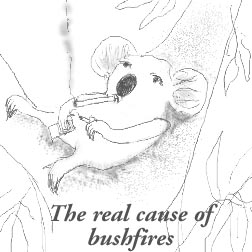
Later that night, the westerly winds picked up and I dreamt that Stewart was on fire in the quarantine station. I woke up and could smell smoke in the air. The bushfires had arrived in Australia. Phil tried to pacify me by saying my imagination was in over-drive from an overabundance of codeine. With searing hot temperatures of 38-plus degrees centigrade, no rain, conditions as dry as a tinder box, strong westerly winds and a maniacal fifteen year old with a match, conditions were perfect for a blazing inferno. We left Coff's Harbor early the next morning to check on Stewart. We drove our rental car southward through a thick mantel of smokey haze arriving at the quarantine station in six hours-record time. It was still standing. The fires around the quarantine station had been extinguished two miles to the South. Other areas around Sydney were not fairing so well. Stewart smelled like expensive bar-b-cued snack food and was VERY happy to see me, which did more good than anything else to improve my downtrodden spirits. On December 25, 1986 my house and all its four and two footed occupants burnt to the ground while I was spending Christmas in Massachusetts with my family. Images on the Sydney TV news brought some of that all back to me. With one exception, whereas at the time I was a blubbering basket case, these tough Aussie men and women just shrug and seemed resigned to the devastation, perhaps a little upset that their Christmas dinner got interrupted. But other than that- "no worries mate". These are perhaps the thickest-skinned people on the planet. 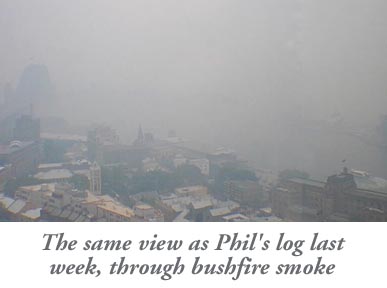
It's no wonder that despite the relative small population of their country, they can clean up at the Olympics. They are outdoor recreation fanatics. Every aspect of their countryside has been turned into a sport, game or money making exercise. From paid climbing tours of the curved spans on the Sydney bridge, to swimming races in surf peppered with sharks and jellyfish- everyone participates in one form or another. Even the liquor advertisements on TV paint a picture of a hard drinking tough-guy population. In one "Mike's Hard Lemonade" commercial, a logger accidently chops his foot off with an ax, his main complaint being that he ruined his brand new boot. He quickly gets over his loss by hopping off with his buddy, no, excuse me, "mate" in search of a "Mikes Hard Lemonade". Perhaps its been my headcold and blocked sinus's but I have had a very hard time understanding what exactly the Aussie's are actually saying. One of the reasons for leaving the French territories was to arrive in an English speaking country. I am still unsure of the wisdom of that move. I overheard this conversation at a roadside eatery on the drive down to Sydney. "Oh bugga! Wheyu is Trevah? I thought he wanted these mushies?" "He took his breakie down to thu billabong." "Crikey the mossies'll get him foe shuwah." I have no idea what they were talking about. 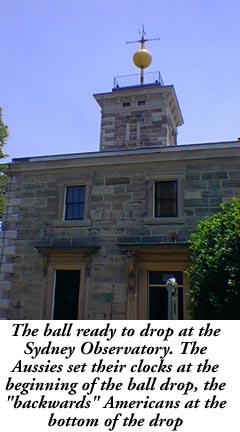
I was pleasantly surprised to find that all Aussies have a very good sense of humor. Frequently it is we Americans that are the butt of their jokes. When we arrived in Coff's harbor the manager of the chandlery said, "No worries, the only reason for the red tape, is because you're Americans." Only it sounded like:" No wurries mite, the own-lye rieason foe the red tipe is becoeus you ah Ameh-ricahns" "Oh, I see" I said, "You guys hate Americans." "No" he replied. "Aussie's don't hite Americans, we just don't like 'em. It's cats we hite.' Now I know I am not the brightest bulb on the Christams tree, but this very fact had very slowly started dawning on me. The Aussie anti-cat campaign was and is a government sponsored project. Cats are blamed for everything, including the extinction of some very unique wildlife. Not many people blame foxes, dogs, dingos or human destruction of wildlife habitat for the demise of some very cool animals. The household tabby is the root of all evil. According to one Australian we met, you can get the necessary permits to put in a housing development, clear away acres of bushland, put in a golf course- or whatever, provided you stipulate in the paperwork that pet cats will be banned. That's how an Aussie can stay environmentally friendly. Government hired sharp shooters roam the countryside clearing the landscape of feral cats. They distinguish pets from wild cats by the animals response to "Here puss, puss." If the cat doesn't come- BLAM he gets it between the eyes. It's not surprising that the book "101 Ways to kill a Cat" was written by an Australian. Such inspirational writings could lead to an ailurophiles retaliatory literary contribution "101 1/2 Ways to Butcher a Bloke". I recently got the following email, which I have copied here exactly as I received it : For Amy: You must be the most interesting cruiser on the planet. I have read many logs and met many cruisers from different places but no one like you. Cruisers leave their countries, put up with living on a small boat, get trashed by storms, leave their friends and families behind just to see new places, new cultures, and meet people from different countries. In your case, you're doing it so that you can whinge and complain about everything. I can't figure out if you are doing this for fun or to torture yourself. In Australia we have something called the 'whinging pom' (because they complain about everything, the sun is too bright, or the sky is too blue), now we have the 'whinging cruiser'. You criticize everyone you meet, complain about everything you see. Why don't you just go back to Maine and stay there, and yes the world will survive without your American dollars. Every time you get to a new destination you complain that there are too many tourists, too many people, that the place is not virgin, too noisy, too smelly or too busy, the food is bad or the water is bad... At the same time you get the shits if you can't just arrive, dock to the marina, get immediate internet access, buy all the spare kits and any gear you need for your backyard built smelly boat, collect your mail and parcels... Do you ever read your logs or listen to yourself. If you're not happy with the treatment you're getting from the Australian officials or the Australian people, why don't you just skip this stop and keep going to NZ. Believe me we will be ok without you spending your American dollars here. And we don't need your fat useless sick cat. We have enough problems in this country with cats decimating the wild life. In some places feral cats are a big problem They just kill everything they can catch. One last advise, if I were you I wouldn't try to explain things to people, because most of the time you get it wrong. And your marine biology knowledge is crap. Why don't you check the logs the Bernons on ITHAKA. You might learn why people go cruising. Hope this will give you an idea of what some of the people who read your logs think. Kind of like the other cruisers who do not like to interact with you. I'm sure many other people think that you're great. Signed, X (I have omitted his name and address, for his own protection should Stewart the killer cat get hold of his address.) Dear Mr. X, Thank you for your holiday greetings. I appreciate your taking the time to email me your thoughts and perspectives. I don't claim to be an expert on anything. I am sure I get lots of things wrong from grammar and syntax, to figures and facts. Often times when I type down these log notes I have no access to the internet, resource books or even a dictionary. I appreciate every reader's input in setting the record straight or providing me the necessary information to make corrections. Perhaps you too could be more specific and I can set the record straight for the final version. We post our logs for several reasons, the main reason being that our internet server provides us with a storage facility for our log notes and digital photos should something go wrong with our computer storage devises or worse yet, should something happen to Iwalani. It also provides our families with a quick and inexpensive way to keep in touch with us. Iwalani's web page is a very small part of a much larger project we are undertaking. I did take the time to check out the Bernon's log on board Ithaka. It's cracker jack reading, filled with lots of ten dollar adventure adding adjectives and adverbs. Its great stuff tracking them as they boisterously bob about the Caribbean. I would also like to point out that they are what I call "career cruisers". They are editors for Cruising World and cruising is their job. I would hope that they love it. My love is veterinary medicine. The ONLY reason I am out here is to see animals in their natural habitat before we humans completely enshroud the globe in the "cement jungle", as you so succinctly put it. I'd also like to point out that you need not torture yourself following our logs. If you don't like what we write, there are plenty of other cruising websites just a mouse click away. Wishing you a Happy New Year! The "wingeing pom" aboard the "backyard built stinky boat" Amy P.S. You are very lucky that Stewart is locked up behind bars. See what I mean? What the heck is a whingeing pom? It must be a cross between a whiner on a binge and a small fluffy dog. The Australians speak their own language. It is time for us to purchase a Macquarie's Australian dictionary. "You're kidding aren't you." Phil asked me, "There really is a Macqarie dictionary?" When I was perhaps thirteen years old, my father's mother sat me down at the kitchen table with the intention of teaching me about her relatives. At the time I remember thinking to myself I really should be writing some of it down. But I didn't, because the teenager part of me figured I could always do it tomorrow. So the facts may have become distorted with time. I may be disseminating misinformation. Errors. Mistakes. Watch out. As I recall, my grandmother told me her grandmother was an entomologist for the Hershey chocolate company. Her name was Katherine MacCrory. I thought it was very cool that I had a Scientist great grandmother, where so many of the relatives on my mothers side were financially oriented. Grammy said that the MacCrory's came to America from a tiny island in Scotland, Their original name had been Macquarie and my great great grandmother had been a direct descendant of a fellow named Lachlan MacQuarie who had once been a governor in Australia, but had returned to Scotland after some "awful" event. The Macquaries changed their name to MacCrory and moved to America. My teenage interest had been peaked as to what the awful event was and why they should change their name, but I could get no more information out of my grandmother. I never thought more about it until we got to Australia. Suddenly we became surrounded with Macquarie-"itis". Lachlan MacQuarie is a big deal in New South Wales. There is a Macquarie bank, a Macquarie town, Macquarie river, Mount Macquarie, Macquarie streets, Lachlan Street, Macquarie University, if you can think up an object or location, a Macquarie version of it exists. Including the dictionary. It will be my goal while in New South Wales to find out why great-great-great-great-grandpop requested three times to resign from his post as Governor of New south Wales in order to return to Scotland and what drove the family to change their name and move to America. 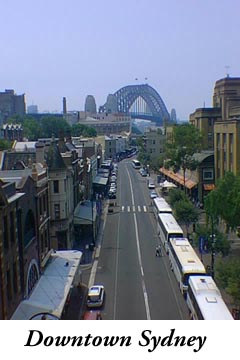
We spent some wonderful days in Sydney, visiting galleries, museums, the Botanical gardens, great restaurants and even a great doctor. While walking down the street we went by the Sydney Medical center. The place looked deserted because of the holidays, but was open. I told Phil that there was no time like the present to get his ear checked out. We had reached the point where I could do no more for it. The infection and swelling has totally cleared up, but he has a hole on the top part of his eardrum, which probably will not heal on its own since his ear has been operated on once before. In order to see an ear, nose, throat specialist we had to first meet with a GP. The doctor on duty was a tall, dark, handsome Indian man named Dr. M. He agreed that the next step might have to be tympanoplasty, or surgery to repair Phil's ear drum. We got to talking and it turns out he not only is a doctor but owns a casting company and has starred in some Indian movies. His latest blockbuster was called Dil Chahta Mai. Which I am sure we saw on the billboards in Fiji. He had been a jet fighter in India flying MIG's against the Pakistani's. He turned to medicine to try and save lives after spending his earlier years taking them away. He, like me, feels life is too short to only have one interest. He invited Phil and I back to air on his radio show, something we may still do if we can get the time. As the New Year approaches I have only one resolution. I will try and not be so negative. Have a Happy New Year! APW |
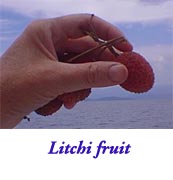 At the veggie markets were selling litchis as the fruit de jour. I had never seen one much less eaten one and managed to buy, after much head scratching,- a "demi-kilo". What a treat! Litchis have a hard plastic-like outter covering which gets peeled off. The flesh of the fruit inside is white and about the consistency of a green grape. The taste is deliciously sweet and juicy and in the middle, voila! The mysterious brown seed we had seen scattered around town. I highly recommend them. The redder they are, the fresher they are.
At the veggie markets were selling litchis as the fruit de jour. I had never seen one much less eaten one and managed to buy, after much head scratching,- a "demi-kilo". What a treat! Litchis have a hard plastic-like outter covering which gets peeled off. The flesh of the fruit inside is white and about the consistency of a green grape. The taste is deliciously sweet and juicy and in the middle, voila! The mysterious brown seed we had seen scattered around town. I highly recommend them. The redder they are, the fresher they are.  On one side, the number one, this time standing for New Caledonia,where we would stay for cyclone season, despite its being smack-dab in the cyclone belt. Phil and I both still think this is an "El Nino" year, which means cyclones would form to the east of New Caledonia. But what do we know? We are just a couple of woodchucks from Maine and certainly are not Pacific weather experts. The picture of the world on the opposite side of the coin, represented continuing westward, spending cyclone season in Australia, where we can do the much needed repairs to the bedraggled Iwalani. The first two flips came up with the world. Phil and I both looked at one another with regret. Perhaps the Ecuadorian penny is unevenly weighted? No, it was time to move on. We were starting to look at real estate agents window displays. The longer we stayed, the harder it would be to leave in April. We would also be too fat to keep Iwalani afloat.
On one side, the number one, this time standing for New Caledonia,where we would stay for cyclone season, despite its being smack-dab in the cyclone belt. Phil and I both still think this is an "El Nino" year, which means cyclones would form to the east of New Caledonia. But what do we know? We are just a couple of woodchucks from Maine and certainly are not Pacific weather experts. The picture of the world on the opposite side of the coin, represented continuing westward, spending cyclone season in Australia, where we can do the much needed repairs to the bedraggled Iwalani. The first two flips came up with the world. Phil and I both looked at one another with regret. Perhaps the Ecuadorian penny is unevenly weighted? No, it was time to move on. We were starting to look at real estate agents window displays. The longer we stayed, the harder it would be to leave in April. We would also be too fat to keep Iwalani afloat. 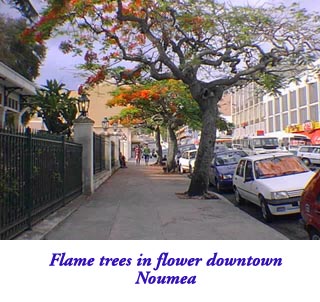 before heading back to Iwalani for the last time. It really is a nice place. I think the guide books purposely paint a picture of an unsettled land composed of unhappy natives waiting to take out the French to gain their independence, in order to keep New Caledonia from becoming a tourist trap. The only political unrest I saw was the Italian-Australian-New Caledonian taxi driver complaining about the money he pays in taxes to further the lives of the natives.
before heading back to Iwalani for the last time. It really is a nice place. I think the guide books purposely paint a picture of an unsettled land composed of unhappy natives waiting to take out the French to gain their independence, in order to keep New Caledonia from becoming a tourist trap. The only political unrest I saw was the Italian-Australian-New Caledonian taxi driver complaining about the money he pays in taxes to further the lives of the natives. 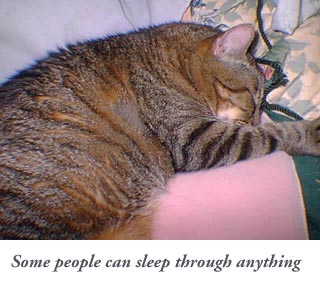 They don't realize that animal's with rabies are first and foremost- sick. Maybe I am nonchalant about it because I've been vaccinated and I still haven't seen a case. I still maintain that the rabies free countries biggest threat, is the rabid bat that will hitch a ride on a container ship. Yachtie pets are not going to be a problem, as long as they have been in rabies free countries for longer than one month. Yet for foot and mouth disease, yachts could be the source of a very big problem.
They don't realize that animal's with rabies are first and foremost- sick. Maybe I am nonchalant about it because I've been vaccinated and I still haven't seen a case. I still maintain that the rabies free countries biggest threat, is the rabid bat that will hitch a ride on a container ship. Yachtie pets are not going to be a problem, as long as they have been in rabies free countries for longer than one month. Yet for foot and mouth disease, yachts could be the source of a very big problem.
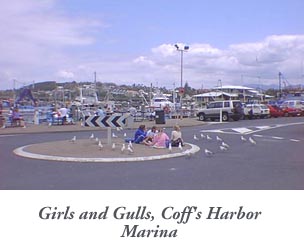 and a couple of fish and chips restaurants. Condo type houses overlook the outer harbor. Long stretches of sandy beach for surfing. Cicadas in the trees with such a loud industrial noise that I thought I was hearing a turbine electricity generating plant when we first arrived. It's not exactly an international tourist destination, but a lot of Australians come here for their own holidays. The best thing about it, is that month long marina slip rental fees are incredibly inexpensive and we are not in the cyclone hot zone. If we could get into the marina. If we could get Stewart to Eastern Creek Quarantine station.
and a couple of fish and chips restaurants. Condo type houses overlook the outer harbor. Long stretches of sandy beach for surfing. Cicadas in the trees with such a loud industrial noise that I thought I was hearing a turbine electricity generating plant when we first arrived. It's not exactly an international tourist destination, but a lot of Australians come here for their own holidays. The best thing about it, is that month long marina slip rental fees are incredibly inexpensive and we are not in the cyclone hot zone. If we could get into the marina. If we could get Stewart to Eastern Creek Quarantine station.
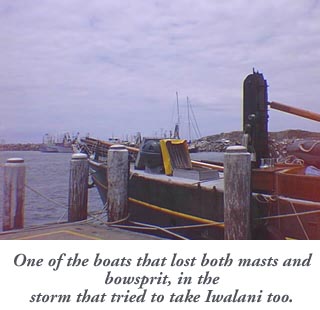 If we get a sixty knot headwind, tough noogies. We'll just have to fill up with water and sink, there is no going into a port of refuge. Along this part of the coast every three days or so, the winds come from a southern direction and are called "southerly busters". They wreak havoc on the south setting Australian current. It is not unusual for the wind to average forty, or more knots. Phil says there is no way we are taking Iwalani to Sydney. I think it would be kind of nice, but getting back to the North end of Australia against the south setting current wouldn't be too much fun. Having a yacht in Sydney is also reputed to be a really rapid way to throw lots of money into a hole on the water.
If we get a sixty knot headwind, tough noogies. We'll just have to fill up with water and sink, there is no going into a port of refuge. Along this part of the coast every three days or so, the winds come from a southern direction and are called "southerly busters". They wreak havoc on the south setting Australian current. It is not unusual for the wind to average forty, or more knots. Phil says there is no way we are taking Iwalani to Sydney. I think it would be kind of nice, but getting back to the North end of Australia against the south setting current wouldn't be too much fun. Having a yacht in Sydney is also reputed to be a really rapid way to throw lots of money into a hole on the water. 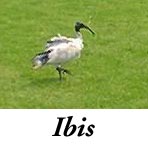 Even in the cities, any cat let outside at nigh is a killer. People who have cats often wake up in the morning to find a half eaten bird or possum in their backyard. Our cities are not like the cement jungles you're used to. We have a huge population of wild life living with us, birds, mammals, marsupials, frogs, etc. So yeh we can do without another useless cat. And By the way, I don't hate cats, I just think that they are very bad for the wildlife, because of their killer instinct and should be banned.
Even in the cities, any cat let outside at nigh is a killer. People who have cats often wake up in the morning to find a half eaten bird or possum in their backyard. Our cities are not like the cement jungles you're used to. We have a huge population of wild life living with us, birds, mammals, marsupials, frogs, etc. So yeh we can do without another useless cat. And By the way, I don't hate cats, I just think that they are very bad for the wildlife, because of their killer instinct and should be banned. 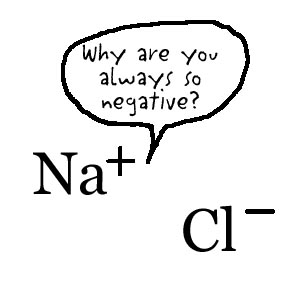 My only real problem is that I must be such a negatively charged person I can't recognize negativity. But I'll try. We really have much to be thankful for. Iwalani got us here in one piece with no major equipment breakdowns. Our families are healthy. We are now healthy. We have met some wonderful people who will be longtime friends, I am sure. So from now on I promise to write no more negative logs. I'll even try to limit the bodily function stuff 'cause I know it grosses out my Dad.
My only real problem is that I must be such a negatively charged person I can't recognize negativity. But I'll try. We really have much to be thankful for. Iwalani got us here in one piece with no major equipment breakdowns. Our families are healthy. We are now healthy. We have met some wonderful people who will be longtime friends, I am sure. So from now on I promise to write no more negative logs. I'll even try to limit the bodily function stuff 'cause I know it grosses out my Dad.